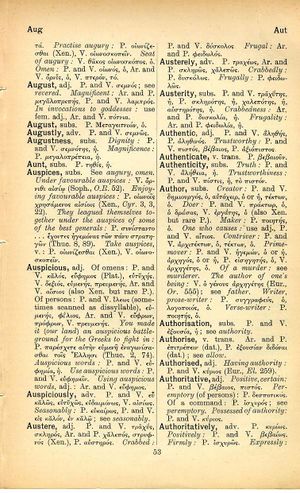authoritative: Difference between revisions
νήπιοι, οἷς ταύτῃ κεῖται νόος, οὐδὲ ἴσασιν ὡς χρόνος ἔσθ᾿ ἥβης καὶ βιότου ὀλίγος θνητοῖς. ἀλλὰ σὺ ταῦτα μαθὼν βιότου ποτὶ τέρμα ψυχῇ τῶν ἀγαθῶν τλῆθι χαριζόμενος → fools, to think like that and not realise that mortals' time for youth and life is brief: you must take note of this, and since you are near the end of your life endure, indulging yourself with good things | Poor fools they to think so and not to know that the time of youth and life is but short for such as be mortal! Wherefore be thou wise in time, and fail not when the end is near to give thy soul freely of the best.
(CSV3) |
m (Woodhouse1 replacement) |
||
| Line 1: | Line 1: | ||
{{Woodhouse1 | {{Woodhouse1 | ||
|Text=[[File:woodhouse_53.jpg|thumb|link={{filepath:woodhouse_53.jpg}}]] | |Text=[[File:woodhouse_53.jpg|thumb|link={{filepath:woodhouse_53.jpg}}]] | ||
===adjective=== | |||
[[positive]], [[certain]]: [[prose|P.]] and [[verse|V.]] [[βέβαιος]], [[πιστός]]. | |||
[[peremptory]] (of [[person]]s): [[prose|P.]] [[δεσποτικός]]. | |||
of a [[command]]: [[prose|P.]] [[ἰσχυρός]]; see [[peremptory]]. | |||
[[possessed of authority]]: [[prose|P.]] and [[verse|V.]] [[κύριος]]. | |||
}} | }} | ||
Revision as of 08:56, 20 May 2020
English > Greek (Woodhouse)
adjective
positive, certain: P. and V. βέβαιος, πιστός.
peremptory (of persons): P. δεσποτικός.
of a command: P. ἰσχυρός; see peremptory.
possessed of authority: P. and V. κύριος.

